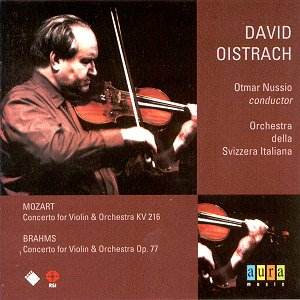The degree of fanaticism necessary to collect all Oistrakh’s
recordings of the Brahms Concerto – commercially released and live –
would be considerable. So the return of the 1961 Lugano performance,
once on Ermitage, doesn’t muddy the known discographic waters as much
as it might. Readers will doubtless be familiar with at least one of
Oistrakh’s traversals, maybe Klemperer or Szell or Konwitschny, but
devotees will be able to rattle off the remaining litany; Abendroth
in 1952, Kondrashin (twice, a decade apart), Pedrotti in Prague in 1961,
Charles Bruck, Fritz Rieger, Abbado in 1972, Rozhdestvensky and the
BBC transcription of a Sargent-led performance. All of which leads inescapably
to the question; what’s so special about this Nussio performance?
Well he brings a weighty depth to the orchestral introduction
and a generally convincing case is made for the exposition of the thematic
material; balance is occasionally awry and trumpets not ideally blended
leading to some stridency, especially later on in the Concerto. Oistrakh
himself suffers from a few of the passing and inevitable failings a
live concert brings with it. There is some unsteadiness in his runs
in the first movement, particularly at 4.20, and some smudged notes
along the way. His tone, sumptuous and big, is a characteristically
welcome feature and few could deny him the glorious lyricism he can
so nobly impart. Yet the climaxes don’t quite work and the climactic
passagework leading to the orchestral peroration and the cadenza is
seriously marred, with that trumpet blare not adding to the subtlety
of the performance. Nussio is adept however at bringing out rich orchestral
incident; especially the horn counterpoint in the second movement; the
oboist here has an individual sense of rubato which is always lively
and affecting and Oistrakh brings a questing simplicity to his line.
In the finale his technique again comes under rather surprising pressure;
some of his passagework is really very approximate but whilst he does
settle down the rather unbalanced recording again emphasises the declamatory
brass to the detriment of Brahmsian blend.
The Mozart Concerto doesn’t involve nearly as much
discographic sleuthing. He conducted the Berlin Philharmonic himself
in his 1971 traversal of the set of the Concertos and recorded the work
with the Philharmonia as well. Ancerl in 1954 and Barshai in 1959 join
with a putative von Matacic led performance to complete the list. There
are some who find his big tone and romantic sensibility inimical to
Mozart – the latest to find fault with him is Victoria Mullova, whose
Damascene conversion to the cause of Original Instruments has led to
a degree of repulsion for his voluptuous sentiment. Luckily music is
a broad church and one can admire, say, Simon Standage in this repertoire
as much or as little as Oistrakh or Francescatti or Kreisler. Oistrakh
and Nussio conjoin in the expected big-boned performance. Enthusiastic
basses drive on the argument in the first movement and at a flowing
tempo in the second, well over a minute faster than his Berlin recording
which found him slightly indulgent, he is radiantly expressive without
the whiplash intensity that a more tonally intense player with a faster
vibrato would have brought to the movement. Nussio sets good tempi here
and equally in the finale – which is buoyant and appealing, and reflective
of the performance as a whole.
I can’t say these are essential additions to the Oistrakh
legacy but I did very much like the Mozart. Sound quality is perfectly
respectable and the attractions of the disc may well offset small concerns
in the Brahms.
Jonathan Woolf
AVAILABILITY
www.aura.com


